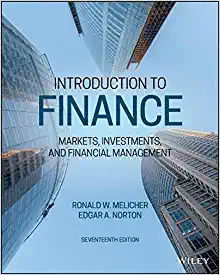Question
Vice Corp issued 12-year coupon bonds 2 years ago at a coupon rate of 8%. The bond was issued at par and pays semiannual coupon
Vice Corp issued 12-year coupon bonds 2 years ago at a coupon rate of 8%. The bond was issued at par and pays semiannual coupon payments. Hard Corp. has 8% coupon bond outstanding, with semiannual coupon payments. The Hardy Corp. bonds currently have 2 years to mature. The interest rate has been unchanged, and both bonds have been priced at par value until just now, when the Fed announced a cut to the annual interest rate by 1 percent.
1. Walter bought one Vice Corp bond at the time of issuing 2 years ago. He has already received four semiannual coupon payments. And he decides to sell the bond after the Fed's announcement. Assume that bond prices change instantaneously to reflect the new interest rate. What is Walter's annualized holding period return? Why is it higher or lower than 8%?
2. What is the percentage change in the price of these bonds?
3. Suppose instead the Fed announced to raise the interest rate by 1 percent. What is the percentage change in the price of these bonds? Illustrate your answers in (b) and (c) by graphing bond prices versus YTM. What does this problem tell you about the interest rate risk of longer-term bonds?
Step by Step Solution
There are 3 Steps involved in it
Step: 1

Get Instant Access to Expert-Tailored Solutions
See step-by-step solutions with expert insights and AI powered tools for academic success
Step: 2

Step: 3

Ace Your Homework with AI
Get the answers you need in no time with our AI-driven, step-by-step assistance
Get Started


